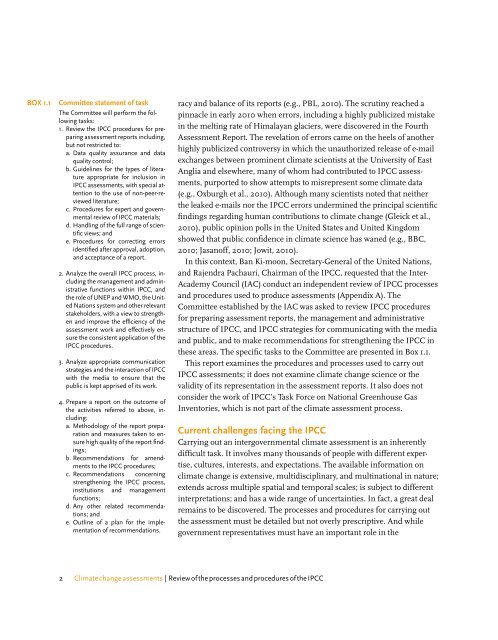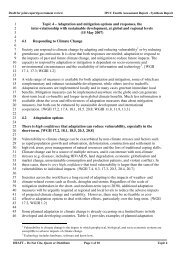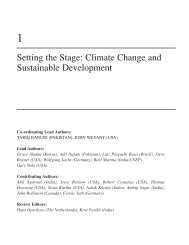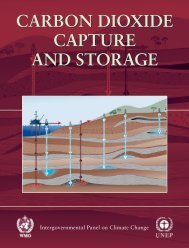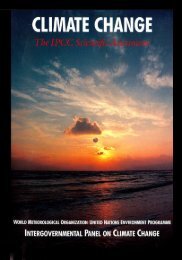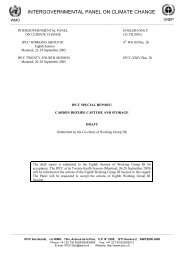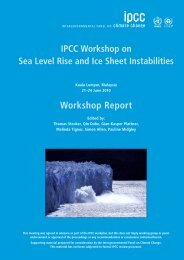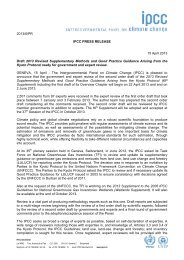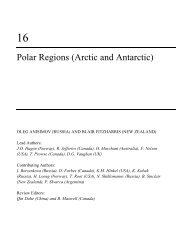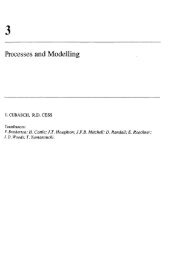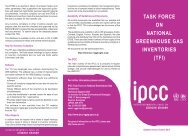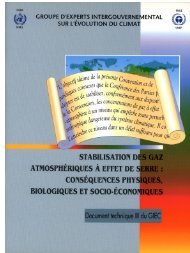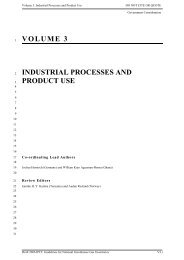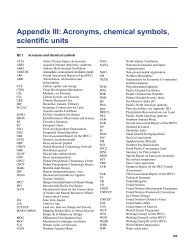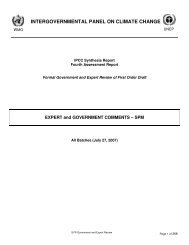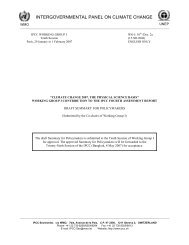Climate change assessments Review of the processes and ...
Climate change assessments Review of the processes and ...
Climate change assessments Review of the processes and ...
You also want an ePaper? Increase the reach of your titles
YUMPU automatically turns print PDFs into web optimized ePapers that Google loves.
BOX 1.1<br />
Committee statement <strong>of</strong> task<br />
The Committee will perform <strong>the</strong> following<br />
tasks:<br />
1. <strong>Review</strong> <strong>the</strong> IPCC procedures for preparing<br />
assessment reports including,<br />
but not restricted to:<br />
a. Data quality assurance <strong>and</strong> data<br />
quality control;<br />
b. Guidelines for <strong>the</strong> types <strong>of</strong> literature<br />
appropriate for inclusion in<br />
IPCC <strong>assessments</strong>, with special attention<br />
to <strong>the</strong> use <strong>of</strong> non-peer-reviewed<br />
literature;<br />
c. Procedures for expert <strong>and</strong> governmental<br />
review <strong>of</strong> IPCC materials;<br />
d. H<strong>and</strong>ling <strong>of</strong> <strong>the</strong> full range <strong>of</strong> scientific<br />
views; <strong>and</strong><br />
e. Procedures for correcting errors<br />
identified after approval, adoption,<br />
<strong>and</strong> acceptance <strong>of</strong> a report.<br />
2. Analyze <strong>the</strong> overall IPCC process, including<br />
<strong>the</strong> management <strong>and</strong> administrative<br />
functions within IPCC, <strong>and</strong><br />
<strong>the</strong> role <strong>of</strong> UNEP <strong>and</strong> WMO, <strong>the</strong> United<br />
Nations system <strong>and</strong> o<strong>the</strong>r relevant<br />
stakeholders, with a view to streng<strong>the</strong>n<br />
<strong>and</strong> improve <strong>the</strong> efficiency <strong>of</strong> <strong>the</strong><br />
assessment work <strong>and</strong> effectively ensure<br />
<strong>the</strong> consistent application <strong>of</strong> <strong>the</strong><br />
IPCC procedures.<br />
3. Analyze appropriate communication<br />
strategies <strong>and</strong> <strong>the</strong> interaction <strong>of</strong> IPCC<br />
with <strong>the</strong> media to ensure that <strong>the</strong><br />
public is kept apprised <strong>of</strong> its work.<br />
4. Prepare a report on <strong>the</strong> outcome <strong>of</strong><br />
<strong>the</strong> activities referred to above, including:<br />
a. Methodology <strong>of</strong> <strong>the</strong> report preparation<br />
<strong>and</strong> measures taken to ensure<br />
high quality <strong>of</strong> <strong>the</strong> report findings;<br />
b. Recommendations for amendments<br />
to <strong>the</strong> IPCC procedures;<br />
c. Recommendations concerning<br />
streng<strong>the</strong>ning <strong>the</strong> IPCC process,<br />
institutions <strong>and</strong> management<br />
functions;<br />
d. Any o<strong>the</strong>r related recommendations;<br />
<strong>and</strong><br />
e. Outline <strong>of</strong> a plan for <strong>the</strong> implementation<br />
<strong>of</strong> recommendations.<br />
racy <strong>and</strong> balance <strong>of</strong> its reports (e.g., PBL, 2010). The scrutiny reached a<br />
pinnacle in early 2010 when errors, including a highly publicized mistake<br />
in <strong>the</strong> melting rate <strong>of</strong> Himalayan glaciers, were discovered in <strong>the</strong> Fourth<br />
Assessment Report. The revelation <strong>of</strong> errors came on <strong>the</strong> heels <strong>of</strong> ano<strong>the</strong>r<br />
highly publicized controversy in which <strong>the</strong> unauthorized release <strong>of</strong> e-mail<br />
ex<strong>change</strong>s between prominent climate scientists at <strong>the</strong> University <strong>of</strong> East<br />
Anglia <strong>and</strong> elsewhere, many <strong>of</strong> whom had contributed to IPCC <strong>assessments</strong>,<br />
purported to show attempts to misrepresent some climate data<br />
(e.g., Oxburgh et al., 2010). Although many scientists noted that nei<strong>the</strong>r<br />
<strong>the</strong> leaked e-mails nor <strong>the</strong> IPCC errors undermined <strong>the</strong> principal scientific<br />
findings regarding human contributions to climate <strong>change</strong> (Gleick et al.,<br />
2010), public opinion polls in <strong>the</strong> United States <strong>and</strong> United Kingdom<br />
showed that public confidence in climate science has waned (e.g., BBC,<br />
2010; Jasan<strong>of</strong>f, 2010; Jowit, 2010).<br />
In this context, Ban Ki-moon, Secretary-General <strong>of</strong> <strong>the</strong> United Nations,<br />
<strong>and</strong> Rajendra Pachauri, Chairman <strong>of</strong> <strong>the</strong> IPCC, requested that <strong>the</strong> Inter-<br />
Academy Council (IAC) conduct an independent review <strong>of</strong> IPCC <strong>processes</strong><br />
<strong>and</strong> procedures used to produce <strong>assessments</strong> (Appendix A). The<br />
Committee established by <strong>the</strong> IAC was asked to review IPCC procedures<br />
for preparing assessment reports, <strong>the</strong> management <strong>and</strong> administrative<br />
structure <strong>of</strong> IPCC, <strong>and</strong> IPCC strategies for communicating with <strong>the</strong> media<br />
<strong>and</strong> public, <strong>and</strong> to make recommendations for streng<strong>the</strong>ning <strong>the</strong> IPCC in<br />
<strong>the</strong>se areas. The specific tasks to <strong>the</strong> Committee are presented in Box 1.1.<br />
This report examines <strong>the</strong> procedures <strong>and</strong> <strong>processes</strong> used to carry out<br />
IPCC <strong>assessments</strong>; it does not examine climate <strong>change</strong> science or <strong>the</strong><br />
validity <strong>of</strong> its representation in <strong>the</strong> assessment reports. It also does not<br />
consider <strong>the</strong> work <strong>of</strong> IPCC’s Task Force on National Greenhouse Gas<br />
Inventories, which is not part <strong>of</strong> <strong>the</strong> climate assessment process.<br />
Current challenges facing <strong>the</strong> IPCC<br />
Carrying out an intergovernmental climate assessment is an inherently<br />
difficult task. It involves many thous<strong>and</strong>s <strong>of</strong> people with different expertise,<br />
cultures, interests, <strong>and</strong> expectations. The available information on<br />
climate <strong>change</strong> is extensive, multidisciplinary, <strong>and</strong> multinational in nature;<br />
extends across multiple spatial <strong>and</strong> temporal scales; is subject to different<br />
interpretations; <strong>and</strong> has a wide range <strong>of</strong> uncertainties. In fact, a great deal<br />
remains to be discovered. The <strong>processes</strong> <strong>and</strong> procedures for carrying out<br />
<strong>the</strong> assessment must be detailed but not overly prescriptive. And while<br />
government representatives must have an important role in <strong>the</strong><br />
2 <strong>Climate</strong> <strong>change</strong> <strong>assessments</strong> | <strong>Review</strong> <strong>of</strong> <strong>the</strong> <strong>processes</strong> <strong>and</strong> procedures <strong>of</strong> <strong>the</strong> IPCC


